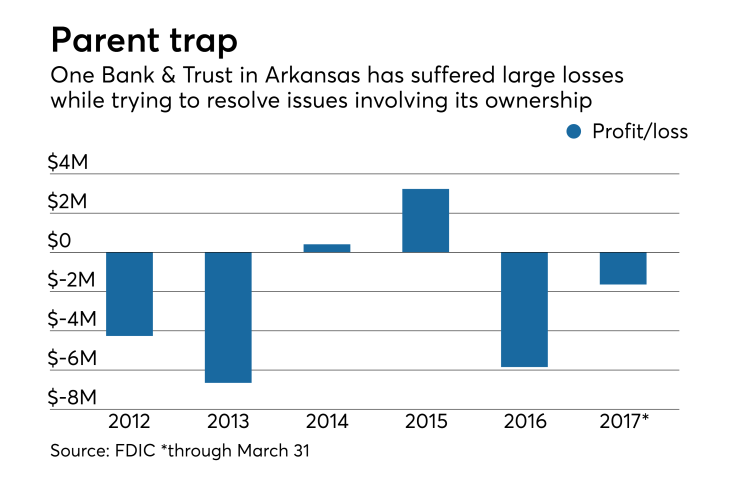An Arkansas bank is slowly wriggling out from under the government’s thumb.
One Bank & Trust in Little Rock is taking a circuitous route to freedom, recently selling about 345,000 shares of its stock to the Treasury Department for an undisclosed sum. The sale means that the Treasury owns a majority stake in the $300 million-asset bank — for now.
The transaction also resolved longstanding uncertainty surrounding ownership of the bank, which does business as Onebanc.
The Treasury seized the stock after obtaining a $48 million judgment against the bank’s holding company, OneFinancial, in January 2016. The judgment was tied to fraud claims associated with the company’s June 2009 participation in the Troubled Asset Relief Program. As a result, the bank was in a kind of legal limbo for more than a year. Now it's in a different but still unusual position.
“I’ve never run into a situation like this before,” said Bert Ely, a banking consultant based in Arlington, Va. “I’m not aware of any other situation where the Treasury has taken ownership of a bank.”
Selling to the government outright was necessary because it finally severed Onebanc’s ties to OneFinancial, said Jerry Pavlas, the bank’s president and CEO.
“The bank is now free and clear of the holding company with a clear path to decide what we want to do next,” said Pavlas, who has been working with Treasury officials to clear a path for a sale or recapitalization,
As Onebanc’s CEO since 2012, Pavlas has been involved in several turnarounds over a 46-year banking career, including an effort to reinvigorate Hibernia in New Orleans years before its 2005 sale to Capital One Financial. Onebanc — by far — has been the most challenging.
“I knew it was going to be difficult, but I didn’t realize how hard it would be until I was in the middle of it,” Pavlas said.
Onebanc, like many banks during the financial crisis, suffered from elevated defaults and chargeoffs. It has lost nearly $19 million since 2010, including $6 million last year.
Its troubles were compounded by a fraud scheme orchestrated by previous management.

Former CEO Layton Stuart, who died in 2013, and several colleagues allegedly diverted tens of millions of dollars of bank funds, including some of the nearly $18 million in Tarp funds OneFinancial received, for personal use.
The federal government
At least two other Onebanc executives
OneFinancial, in terms of preferred stock, is the biggest bank remaining in Tarp. Though First BanCorp is on the hook for more money, the Treasury eventually converted its holdings in the San Juan, Puerto Rico, company into common stock.
Despite lingering issues, Onebanc has managed to retain most of its customers while continuing to operate a solid core franchise that should attract investors or bank acquirers, Pavlas said.
Meanwhile, Pavlas has been repairing Onebanc’s balance sheet. Nonaccrual loans, which peaked in 2013 at $17.1 million, are down to $5.6 million, according to data from the Federal Deposit Insurance Corp.
“We never lost sight of … improving the bank,” Pavlas said, adding that a sale should not affect Onebanc’s operations, employees or customer relationships. “We’ve basically done a total rebuild.”
A Treasury spokesperson did not respond to questions about Onebanc, though published reports have indicated that the agency
“I’d be shocked if they weren’t actively marketing the bank,” Ely said, noting that Onebanc’s troubles have taken a toll on its capital levels. The bank’s total capital ratio was 6.76% at March 31.
Pavlas, for his part, said the bank is approaching its future with an open mind.
"We will evaluate all the options and do what's in the best interests of the bank," he said.





